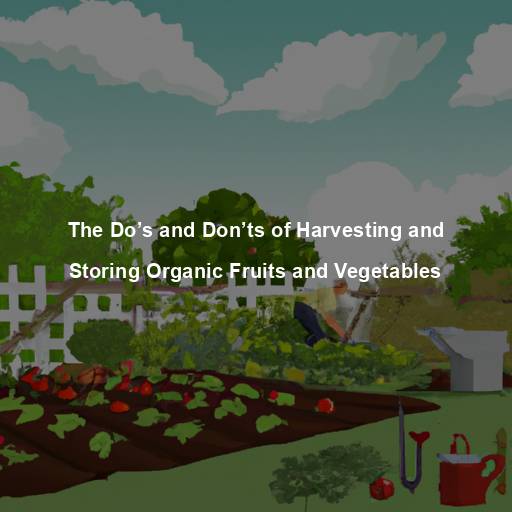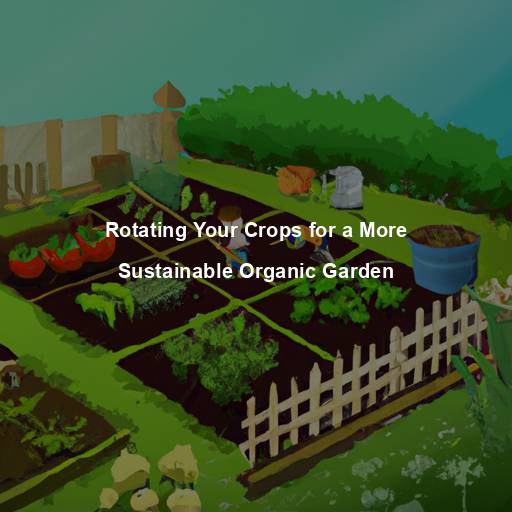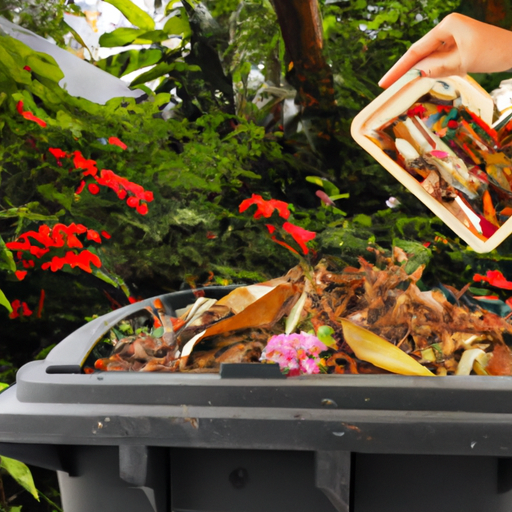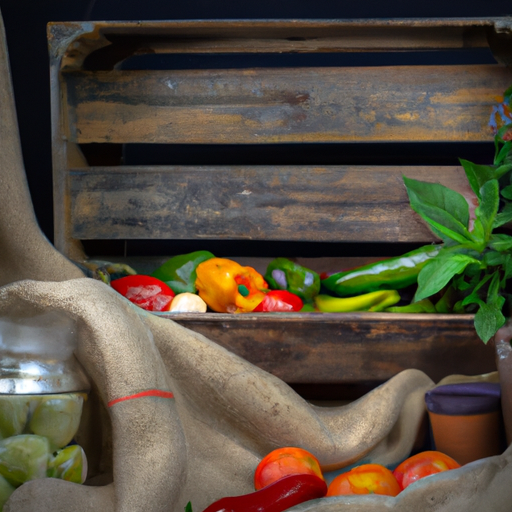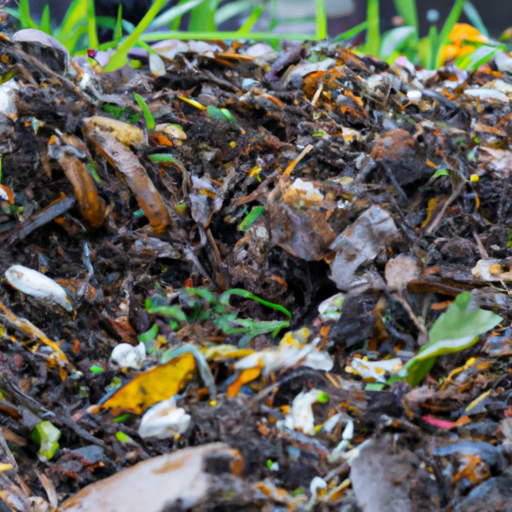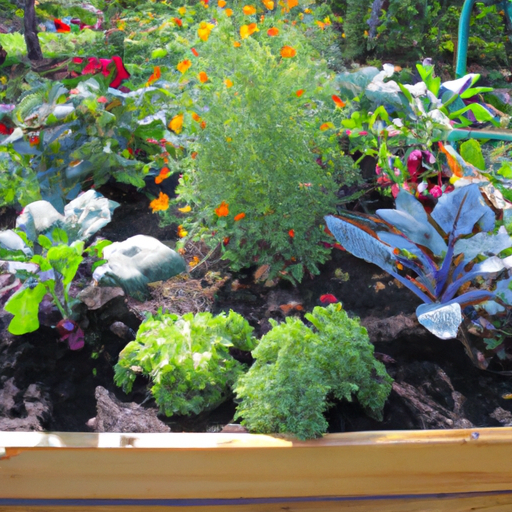As a Master Gardener, one of the most important aspects of organic gardening is knowing how to properly harvest and store fruits and vegetables.
While it may seem like a simple task, there are many do’s and don’ts that can make all the difference in preserving your produce’s freshness and flavor.
Firstly, when harvesting your organic crops, it’s crucial to handle them with care. This means avoiding rough handling or dropping them onto hard surfaces as this can cause bruising and damage.
Additionally, always use sharp tools such as shears or knives to reduce stress on the plants and minimize any potential for disease transmission.
By following these basic guidelines, you’ll be well on your way to enjoying delicious home-grown produce that will last long after harvest season has ended.
Handling Your Crops With Care
As a Master Gardener, handling your crops with care is crucial to ensure their quality and longevity. Your fruits and vegetables are delicate beings that require attention and patience during the harvesting process. Think of them as precious gems waiting to be picked from the earth.
Before you start picking, make sure your hands are clean to avoid contaminating your produce. Cleaning techniques such as using gloves or washing your hands with soap will prevent any unwanted bacteria from affecting your harvest.
Once you have gathered all of your crops, it’s time to think about packaging options. Choose containers that allow for proper ventilation while also protecting them from damage during transport. Remember, every step in this process matters – treat your crops with respect and they’ll reward you with delicious flavors and nutrients for months to come.
Using Sharp Tools For Harvesting
Before harvesting your organic produce, it’s important to ensure that your tools are in good condition. Sharpening techniques should be used regularly to maintain the sharpness of your cutting implements. This not only makes them more effective but also reduces the risk of injury during use.
Safety precautions must always be observed when using sharp tools for harvesting. Always wear protective gear such as gloves and goggles to prevent any accidents from happening. Additionally, keep children away from these tools at all times to avoid any mishaps.
By following these do’s and don’ts, you can safely harvest and store your organic fruits and vegetables with ease.
– Regularly sharpen your cutting implements
– Wear protective gear like gloves and goggles
– Keep children away from sharp tools
– Store harvested fruits and vegetables in a cool, dry and well-ventilated area
Properly Storing Your Organic Produce
Just as using sharp tools can make all the difference in harvesting your organic produce, properly storing it is equally important to ensuring its longevity.
Think of your harvested fruits and vegetables as a library – you want to rotate stock so that nothing goes bad or expires before it’s been used. This means keeping track of what you have and when it was picked, making sure to use up older items before newer ones.
Additionally, storage containers should be breathable to prevent moisture buildup and spoilage. Glass jars with loose-fitting lids, mesh bags, and paper sacks are great options for this purpose.
By following these do’s and don’ts of proper storage, you’ll be able to enjoy your fresh organic produce for weeks after harvest.
Avoiding Common Storage Mistakes
Now that you have harvested your organic fruits and vegetables, it’s important to store them properly to ensure their longevity.
One common mistake in storage is not properly cleaning the produce before storing it. Make sure to remove any dirt or debris from the surface of the fruit or vegetable using a gentle scrub brush or damp cloth. This will prevent mold and bacteria growth while in storage.
Another mistake is choosing inappropriate containers for storage. While plastic bags may seem like a convenient option, they actually trap moisture which can lead to rotting. Instead, opt for breathable containers such as mesh bags, paper bags, or glass jars with lids that allow air flow.
Proper cleaning and container options are key factors in avoiding common storage mistakes when harvesting organic produce.
Maximizing Freshness And Flavor
Did you know that the average distance for produce to travel from farm to table is 1,500 miles? That’s a lot of time on the road and in storage before it reaches your kitchen!
So when you’re lucky enough to harvest your own organic fruits and vegetables, make sure to take advantage of their freshness by preserving them properly. One way to preserve your bounty is through canning or pickling. Not only does this extend the life of your produce, but it also adds new flavors and textures to your meals.
Another method is freezing – simply blanch your veggies beforehand and store them in freezer-safe bags for up to eight months. And let’s not forget about dehydrating – this technique works great for herbs, tomatoes, and even apples.
The benefits of fresh produce are undeniable – they taste better, have higher nutrient content, and support local farmers. By taking advantage of different ways to preserve your harvest, you’ll be able to enjoy these benefits all year long without sacrificing flavor or quality.
Frequently Asked Questions
What Is The Best Way To Wash Organic Produce Before Storing It?
When it comes to washing organic produce before storing, there are a few methods that can be effective.
One popular option is using a vinegar rinse, which involves mixing water and vinegar in a bowl and soaking the fruits or vegetables for a few minutes before rinsing with cold water.
Another method is using a hydrogen peroxide wash, where you mix water and food-grade hydrogen peroxide and soak the produce for about 5-10 minutes before rinsing thoroughly.
Both of these options can help remove any lingering dirt or bacteria on your fresh produce.
Once washed, it’s important to consider storage solutions that will keep your organic fruits and veggies fresh longer.
For example, using breathable bags or containers can prevent moisture buildup and prolong shelf life.
Additionally, keeping certain items separated (such as ethylene-producing fruits like apples away from leafy greens) can also help maintain freshness.
By following these tips, you’ll be able to enjoy your organic produce at its peak for longer periods of time!
Can I Use Plastic Bags To Store Organic Fruits And Vegetables?
When it comes to storing organic fruits and vegetables, using plastic bags may not be the best option.
Instead, opt for reusable containers or alternative storage materials such as glass jars or cloth produce bags.
Not only are these options better for the environment, but they also help to maintain the quality and freshness of your produce.
By avoiding plastic bags, you reduce the risk of trapping moisture and causing mold growth on your fruits and veggies.
So next time you’re storing your organic produce, consider making the switch to more sustainable options.
Your taste buds (and the planet) will thank you!
How Long Can I Store Organic Produce In The Refrigerator Before It Goes Bad?
Ah, the age-old question of how long you can keep your freshly harvested organic produce in the fridge before it starts to go bad.
Proper storage is key when it comes to maximizing shelf life and maintaining optimal freshness. As a Master Gardener, I always recommend storing fruits and veggies in breathable containers or bags to prevent moisture buildup that could lead to spoilage.
And don’t forget to remove any damaged or rotting pieces before refrigerating! While exact estimation of shelf life depends on the type of produce and its ripeness at harvest, as a general rule of thumb most organic goods should last anywhere from 3-7 days if stored properly.
Is It Necessary To Remove All Dirt And Debris From Organic Produce Before Storing It?
It is absolutely necessary to remove all dirt and debris from organic produce before storing it, as any remaining soil may lead to bacterial growth that could spoil the fruits or vegetables.
This is especially important if you plan on storing your produce at room temperature, where bacteria can thrive more easily than in a refrigerator.
As a Master Gardener, I highly recommend washing all of your organic produce thoroughly with clean water before storage.
By taking this extra step, you’ll be able to enjoy fresh and healthy fruits and vegetables for longer periods of time.
Can I Freeze Organic Produce For Long-Term Storage?
As a Master Gardener, I have tested various freezing techniques for organic produce and can confidently say that it is possible to freeze fruits and vegetables for long-term storage.
However, not all produce freezes well, so it’s important to do some research before attempting this alternative storage method.
Some general tips include blanching vegetables before freezing, using freezer-safe containers or bags, and labeling with the date of freezing.
While freezing can be convenient, there are also other alternative storage methods such as root cellaring, canning, and dehydrating that may work better for certain types of produce.
It ultimately depends on your personal preference and the type of harvest you have.
Conclusion
In conclusion, as a Master Gardener myself, I highly recommend following the do’s and don’ts of harvesting and storing organic fruits and vegetables.
It is important to wash your produce thoroughly before storing it in order to remove any dirt or debris that may cause spoilage.
While plastic bags can be convenient for storage, they are not the best option as they trap moisture which can lead to mold growth.
It’s also crucial to keep an eye on expiration dates when storing organic produce in the refrigerator.
However, if you’re looking for long-term storage options, freezing your organic produce is a great choice.
By taking these steps to properly store your organic fruits and vegetables, you’ll be able to enjoy their fresh taste and nutritional benefits for weeks or even months to come!
